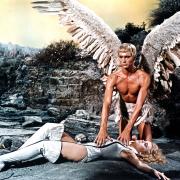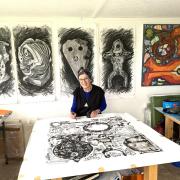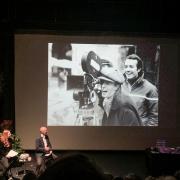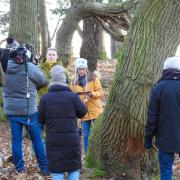Bridport’s From Page To Screen is the only festival which celebrates the adaptation of books to film. This year’s curator, filmmaker Jon Ronson, and its speaker, novelist Nick Hornby, recall their own experiences

Novelists are, mostly, model interviewees. Articulate, they always have books to sell so invariably say ‘yes’ and best of all - because they spend way too much time on their own - they are superbly garrulous.

Nick Hornby and Jon Ronson – guest speaker and curator at this month’s From Page to Screen film festival in Bridport - are no exception.
Hornby - arguably best known for his 1995 novel High Fidelity but also a hugely successful screenwriter - will be discussing both arts with Ronson, a journalist and author whose own bestseller, The Men Who Stare at Goats, was made into a 2009 film starring George Clooney.
The two have exciting new projects. A Long Way Down – the starry movie of Hornby’s 2005 novel – premieres at the Bridport festival. So too, Ronson’s semi-autobiographical film Frank, which he co-wrote.
And they have an easy rapport. “Nick and I have had lots of conversations over the years about the ups and downs of adapting things for the screen,” says Jon. “His advice is always ringing in my ears when I deal with movie people.”
But they have much in common. Both have fiercely supportive wives. Nick’s wife Amanda is a film producer and, as Nick reveals, was key to the making of A Long Way Down.
“Amanda put the team together and found the money. But she also spends some of her time being rejected and, when it’s my work, she tells me white lies. When it’s a ‘no’, she’ll come back and say ‘they really liked it, but’ – which generally means ‘they hate it’. She spares me.”
Jon’s wife Elaine famously – and delightfully - leapt to his defence after he got an inexplicable bashing on Mumsnet.
‘What a response,’ she posted in a withering reply to ‘nasty, puerile comments’ about her husband. ‘I was just surprised that such poison would emanate from a website for mums. Although seeing how much time you all spend on this I can’t believe you are mums. Are you all in institutions?’
Both men rely heavily on their own experience. Hornby’s first book, Fever Pitch, was essentially the memoir of an Arsenal fan. A Long Way Down – which weaves together the stories of four suicidal strangers who meet when they opt to jump off the same roof also draws on facets from Hornby’s own psyche.
The Men Who Stare At Goats is based on Ronson’s journalistic research into the US Army’s exploration of New Age concepts and the potential military applications of the paranormal. Frank is a fictionalised account of his time as keyboard player for Frank Sidebottom – the extraordinary, papier-mâché headed stage persona of musical oddball Chris Sievey.
Both also have a peculiar love-hate relationship with screenwriting. Hornby – who won an Oscar nomination for his movie script for Lynn Barber’s An Education - now only adapts other writers’ books while Ronson fears Frank may be his one and only hurrah.
“I don’t want to adapt my own novels. When I’ve just spent three or four years writing the bloody thing, I don’t want to start taking it all apart again,” says Nick.
“And it’s a perilous journey in terms of uncertainty of outcome. You just have absolutely no way of knowing if the film will ever be made. Chances are it won’t be. I’ve been lucky – four of my books have made it as films. But for every ten books that are optioned, nine don’t get made. Things go wrong. You get the wrong director, script, cast or soundtrack. There are a million reasons why films don’t work out. With a book, it’s just down to you.
“Having the author isn’t necessarily a help, either. We can be terribly precious. Authors don’t really want to chuck things out. But you have to as a screenwriter. If a book were filmed unabridged, it would have to be eight or nine hours long, so you’ve got to get rid of three quarters of it. The author isn’t always the best judge.
“It’s a very different craft. Writing a novel has nothing to do with writing a screenplay. There is no guarantee you’ll be good at both. I’m very lucky that I seem to be semi-competent in both.”
This is quintessential Hornby: modest to the point of self-effacing.
“I’m always very humbled that anyone takes my books seriously enough to want to make a film. When I see all the hundreds of people involved on set, I feel vaguely embarrassed.
“I still don’t like my own writing. One of the reasons I keep at it is to get better and I think I have but you’re chasing the end of a rainbow. That’s why artists paint the same thing thousands of times – striving for an impossible perfection.”
Certainly, Hornby – who has sold millions of books – never expected success. The son of a self-made millionaire, he quit teaching English in his early 30s to devote himself to writing but years of struggle and doubt preceded Fever Pitch, his breakthrough novel published in 1992, when he was 35.
“I am naturally depressive,” he confesses. “I was never suicidal or completely black. It was more an utter conviction of failure, a strain of English miserabilia.
“But writing is a funny job – you spend an awful lot of time on your own. One of the reasons I started doing more film work was the chance to work with other people and have actual meetings.”
A Long Way Down addresses such feelings of isolation as well as exploring four phases of Hornby’s life. Jess is a teenager with a successful father, JJ a young man struggling with failure, Martin a middle-aged celebrity and Maureen a parent whose life has been blighted because her son is severely disabled.
Father-of-three Nick’s eldest son Danny is now 21 but was just 12 when he wrote A Long Way Down. Severely autistic, he needs special care and will never speak.
“I wouldn’t have written that character if I hadn’t had Danny but the book doesn’t describe my son, my relationship with my son or my feelings. It’s about what he led me to discover, a world I only know about through him.”
Ronson, at 46, is ten years younger than Hornby. But he has had his share of knocks, too. Frank is his third attempt at a screenplay.
“My first two were based on journalism I’d done – one was about a town in Alaska where they celebrate Christmas every day of the year, the other was about the British hacker Gary McKinnon. They didn’t get made – most screenplays don’t.”
Jon has, however, an abundance of a writer’s three prerequisites: he never quits, he’s quick to learn and he always rides his luck.
The Men Who Stare At Goats brought him into contact with Peter Straughan, who wrote the screenplay.
“Peter didn’t want to meet me when he was writing. He probably felt he wanted to sort of own the material and if the author was sitting around he wouldn’t feel free. I could have been a total pain, breathing down his neck. But when I read the screenplay and loved it, we became friends.”
In 1987, Jon was the 20-year-old entertainments officers at the Polytechnic of Central London. One day, when told that the Frank Sidebottom Oh Blimey Big Band were going to have to cancel because their keyboard player was sick, he said, with typical chutzpah, ‘I play keyboards’. ‘Well you’re in’ was the band’s reply. And that was that: Ronson became a full-time member.
Nineteen years later, he wrote a piece for The Guardian about his surreal time with Frank, a one-off who sang with a clothes peg clamped to his nose – beneath his big false head - and who knew just three chords, C, F and G.
Peter – riding high after co-writing the screenplay for Tinker, Tailor, Soldier, Spy - read Ronson’s article and was hooked. Together, over the next five years, they wrote the script.
“It’s been a total collaboration,” says Ronson. “But I had to relearn everything – I was completely baffled and befuddled by the process of screenwriting.
“Peter is a genius and he’s taught me an incredible amount. The horrific infinity of fiction – and that’s essentially what Frank became – freaked me out at first. The realisation that I could do anything: I could shoot the character based on me into space if I wanted. Journalists have to abide by rules – well, most of us do, anyway – but in fiction you have to invent your own rules.
“Screenplays are like relationships and sharks – they have to keep moving. Every scene has to move you forward: in Act 1, you put someone up a tree, in Act 2, you throw stones at them and in Act 3 you get them down.
“But, at the same time, it’s not formulaic. And as for clever wordplay, you have to throw all that out of the window. You’re not writing a book but a blueprint for a film. It’s intriguing but complicated. I don’t know if I’ll ever be able to do it again.”
Frank features Hollywood heavyweight Michael Fassbender in the lead role. But Jon had no doubt that his film would attract a big name.
As he says with an impressively straight face: “There’s never been a film with a man in a really big head. It’s the ultimate prosthetic, a real acting challenge. I knew that would have a huge appeal to stars.”
Now, there’s a tip.



























